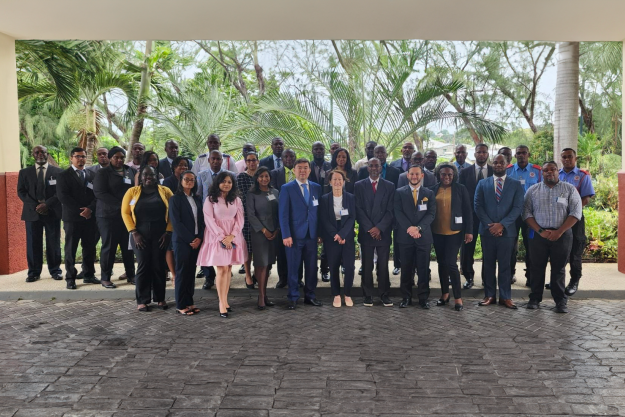The Organisation for the Prohibition of Chemical Weapons (OPCW), in collaboration with the Government of Barbados, organised a subregional forum on the national implementation of the Chemical Weapons Convention (CWC) for English-speaking Caribbean countries from 3 to 5 October 2023 in Bridgetown, Barbados.
The forum underscored the critical importance of raising awareness of the Convention and the pressing need for capacity building activities related to its implementation that address the unique perspectives and challenges encountered by Caribbean islands. It emphasised that comprehensive and robust national legislation is vital to counter chemical terrorism and illicit trade of chemicals across borders. Without comprehensive legislation barring all activities prohibited by the Convention, States Parties may face limitations in their ability to investigate, prosecute, or penalise those involved.
Even in countries without a major chemical industry, robust transshipment controls are required to prevent the illegal transfer of scheduled chemicals across borders. These regulatory frameworks are also needed to protect the environment and mitigate risks associated with storing and handling hazardous substances.
The event gave experts the opportunity to exchange information, identify common challenges and share best practices related to the national implementation of the Convention. The forum was attended by 44 delegates representing twelve countries in the Caribbean region: Antigua and Barbuda, Barbados, Belize, Dominica, Grenada, Guyana, Jamaica, Saint Kitts and Nevis, Saint Lucia, Saint Vincent and the Grenadines, Suriname, and Trinidad and Tobago.
In addition, experts from various organisations, including the UN Office of Counter-Terrorism; the UN Regional Centre for Peace, Disarmament, and Development in Latin America and the Caribbean; the Interregional Crime and Justice Research Institute; the UN Office on Drugs and Crime; the Caribbean Community; the World Customs Organization; the Centre for Biosecurity Studies at the University of the West Indies; and the International Chemical Trade Association, also participated in the event.

Background
As per Article VI, an important requirement for the national implementation of the Convention is for States Parties to adopt the necessary national measures to ensure that toxic chemicals are only used for peaceful purposes.
Article VII covers national implementation of the Convention and requires each State Party to enact implementing legislation at the national level.
As the implementing body for the Chemical Weapons Convention, the OPCW, with its 193 Member States, oversees the global endeavour to permanently eliminate chemical weapons. Since the Convention's entry into force in 1997, it is the most successful disarmament treaty eliminating an entire class of weapons of mass destruction.
On 7 July 2023, the OPCW verified that all chemical weapons stockpiles declared by the 193 States Parties to the Chemical Weapons Convention since 1997 - totalling 72,304 metric tonnes of chemical agents - have been irreversibly destroyed under the OPCW's strict verification regime.
For its extensive efforts in eliminating chemical weapons, the OPCW received the 2013 Nobel Peace Prize.






